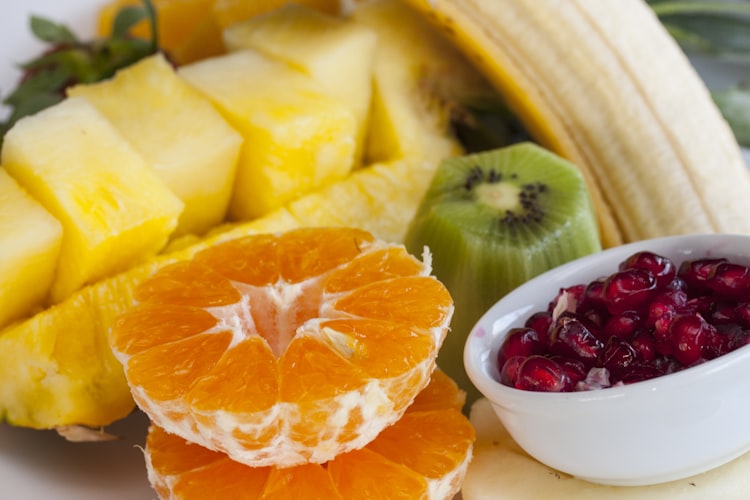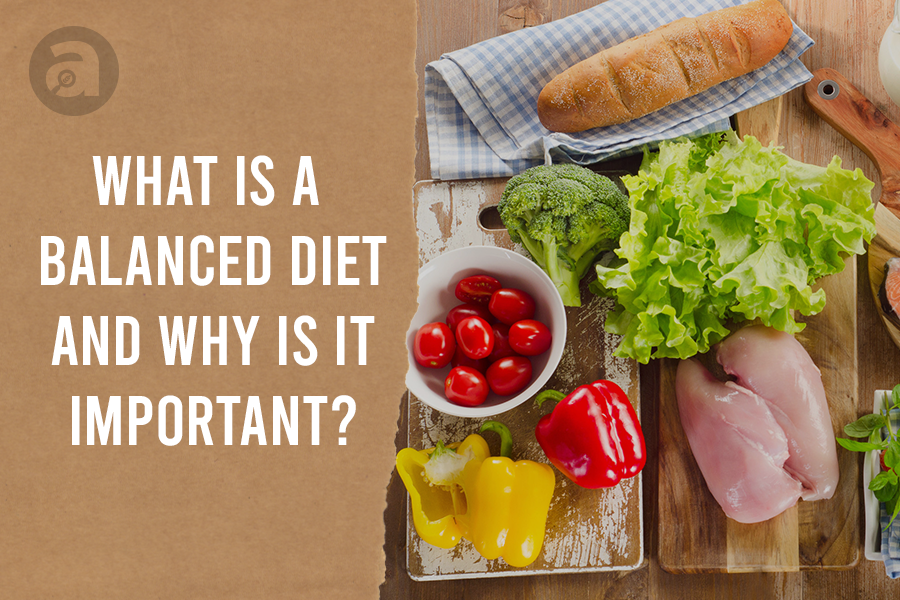Balanced Diet | Why Healthy Diet | 7 Nutrients | FAQ
These days, health and fitness are among the top priorities for almost everyone. While exercising is key to staying healthy, having a balanced diet is equally important. Unfortunately, lack of time and effort has led to the replacement of nourishing food with packaged and ready-to-eat foods, which are unhealthy. The result is that people are getting overweight and developing various health problems.

What Is A Balanced Diet?
A balanced diet is a holistic composition of essential nutrients such as carbohydrates, proteins, fibres, fats, and vitamins and minerals, in adequate proportions. A balanced diet is an ideal food for healthy living. It contains the right amount of essential nutrients in every bite.
To stay healthy, a balanced diet is required. It helps to improve the overall health of the body and promote proper growth and development in children. The nutrients present in a balanced diet can help you maintain your ideal weight as well as enhance muscle tone and immunity.
Why is a healthy diet important?
Maintaining a healthy diet, comprising the right balance of essential nutrition, protects us from diseases, boosts the immune system, and always keeps us active and rejuvenated. It also helps in regulating our digestion and metabolism, along with retaining the right body weight.
Healthy eating habits and balanced nutrition are essential for every individual. People should eat right, especially those who want to stay fit and healthy. A balanced diet can help you achieve your fitness goals as well as build muscle mass and burn fat.
Nutrients in Food
A health-conscious person knows that hitting a gym isn’t enough to maintain the energy of the body while burning calories. Little negligence with nutrients in our body can have a heinous impact on it.
What are Nutrients?
Nutrients are the compounds in foods that help us to maintain our health while providing us with energy. They are the building blocks that help the body to repair and grow substances that are necessary to regulate chemical processes within the body, thus ensuring healthy growth in our personal life.
7 Essential Nutrients in Food
1. Proteins

Rightly called the building blocks for our body, proteins help in the growth and repair of cells. A healthy diet should be such that at least 10-15% of our daily calorie intake should come from proteins. While vegetarians can consume pulses (dals), soy, milk, and milk-based products, non-vegetarians can fulfil their daily requirements from eggs, lean meat, and fish.
2. Carbohydrates

Carbs are often misunderstood for the vices they carry – weight gain, blood sugar, and health issues. However, the truth is that carbohydrates supply the energy to sustain our bodies. Without them, our bodies may experience fatigue and mood swings. Ensure 50-60% of the daily calories are derived from carbohydrates. Natural sources such as vegetables, fruits, chapatis, grains, and rice should be preferred. Intake of processed food items such as preserved fruit juices and beverages, biscuits, namkeens, etc. can be avoided.
3. Fibres

Fibres are the secret to maintaining our physical and mental well-being. They contain essential antioxidants and micro-nutrients, which nourish our skin and regulate bowel movement. Fruits, leafy vegetables, and grains are rich sources of fibres.
4. Fats

People who are suddenly attracted to fitness make it a point to cut down on their fat intake. It is considered to be a key reason for all heart-related issues. However, this is a myth as not all fats are bad. Inclusion of fatty foods rich in Omega-3 nutrients, such as nuts (desi almonds, walnuts, pistachios), clarified butter/desi ghee, and certain varieties of fish, are known to reduce bad cholesterol, which unclogs the arteries and thus strengthens the heart.
5. Vitamins

Vitamins are vital for maintaining our physical, mental, and emotional well-being. They also help in the healthy growth of hair and nails. The key nutrients that must be obtained from food include Vitamin A (in theform of carrots, sweet potatoes, apricots), Vitamin B (in the form of whole grains and legumes), Vitamin C (in the form of citrus fruits and tomatoes), Vitamin D (in the form of eggs and dairy products), and Vitamin E (in the form of nuts and seeds).
6. Minerals

Minerals are essential for the normal functioning of our body. They also help in the growth and development of bones, teeth, skin, hair, and nails. The key minerals that must be obtained from food include Calcium (in the form of milk), Magnesium (in the form of nuts), Phosphorus (in the form of pulses and cereals), Potassium (in the form of bananas, avocados, oranges) and Zinc (in the form of meat).
7. Water

Water is the most important nutrient in our body. We need to drink eight glasses of water every day, which will keep us hydrated and prevent dehydration. Water also helps in flushing out toxins from the body. The recommended daily intake of water is 1 litre for women and 1.5 litres for men. Water acts as a solvent to dissolve other nutrients into our bloodstream, especially proteins, minerals, and vitamins.
Healthy nutrition must include all nutrients in the form of fresh fruits and vegetables, whole grains, legumes, nuts, lean proteins, meat, eggs, and dairy. In the process of calculating calorie intakes, do not forget the water, as our body is formulated over 60% of water. Drinking enough water keeps your body hydrated, maintains body temperature, and helps in keeping the vital organs and skin healthy. Thus, try drinking at least 3 litres of water per day.
How to follow a balanced diet?

- Start by reducing the portion size of ‘unhealthy’ foods in your daily habits
- Try to prepare your home-cooked meals to have better control over the nutrition
- Look out for the unhealthy food ingredients and replace them with healthier substitutes, wherever possible
- Follow a proper routine for having your meals to allow adequate time for digestion
- Finally, avoid bingeing when you are not in the best of spirits as stress, loneliness, etc. create cravings towards junk foods
FAQ

What foods should be included in a balanced diet?
A balanced diet includes all five groups of food: cereals, fruits, milk products, vegetables, and oil. All the food groups are important, but certain food items should be given priority. The general rule is to have at least 2-3 servings of fruits and vegetables every day. Each group should comprise about one-third each (or more) to meet the recommended daily intake for all nutrients.
Which foods should be avoided when trying to maintain a healthy lifestyle?
Foods rich in saturated fats are the most important foods to avoid are those that are high in saturated fat, trans-fat, and cholesterol. These include red meat, processed meats (hot dogs, sausages), butter, eggs, vegetable oils, etc. Also, low calorie sweetened beverages should be avoided.
Tobacco, alcohol, and any other addictive substances should be avoided as they contribute to the development of various health problems.
How can I know what nutrients I am lacking in my diet?
One of the best ways to determine what nutrients you are lacking in your diet is by taking a food diary. A food diary can be used as an effective tool for identifying any nutrient deficiencies that may have developed due to dietary changes.
It is important to know what nutrients you are lacking in your diet, and which ones you should be having more of.
What's more important for a healthy lifestyle - exercise or diet?
The two should be combined to achieve the best results. The benefits of exercise can only be achieved if you eat well and get enough rest. Diet is important, but it is not enough on its own to make you healthy.
So, the cornerstone to a healthy nutritional diet is to understand the core of food and replace the processed foods with real foods. So, choose food products that are organic, good, and understand the nutrient values that they add up to your body. Because eating food that is as close as possible to the way nature made it, can make a huge difference to the way you think, look, and feel. So, your stop for the best nutritional value-based oil is Anveshan Farm.


